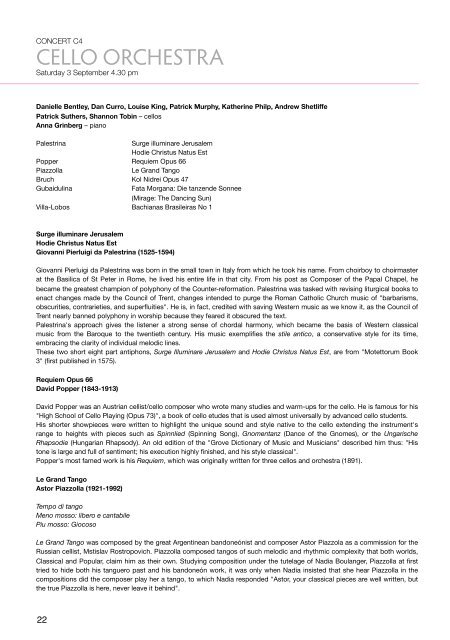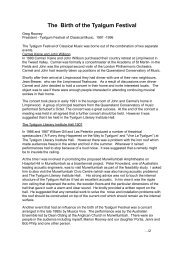Here - Tyalgum Festival of Classical Music
Here - Tyalgum Festival of Classical Music
Here - Tyalgum Festival of Classical Music
You also want an ePaper? Increase the reach of your titles
YUMPU automatically turns print PDFs into web optimized ePapers that Google loves.
CONCERT C4<br />
CELLO ORCHESTRA<br />
Saturday 3 September 4.30 pm<br />
Danielle Bentley, Dan Curro, Louise King, Patrick Murphy, Katherine Philp, Andrew Shetliffe<br />
Patrick Suthers, Shannon Tobin – cellos<br />
Anna Grinberg – piano<br />
Palestrina<br />
Surge illuminare Jerusalem<br />
Hodie Christus Natus Est<br />
Popper Requiem Opus 66<br />
Piazzolla<br />
Le Grand Tango<br />
Bruch Kol Nidrei Opus 47<br />
Gubaidulina<br />
Fata Morgana: Die tanzende Sonnee<br />
(Mirage: The Dancing Sun)<br />
Villa-Lobos Bachianas Brasileiras No 1<br />
Surge illuminare Jerusalem<br />
Hodie Christus Natus Est<br />
Giovanni Pierluigi da Palestrina (1525-1594)<br />
Giovanni Pierluigi da Palestrina was born in the small town in Italy from which he took his name. From choirboy to choirmaster<br />
at the Basilica <strong>of</strong> St Peter in Rome, he lived his entire life in that city. From his post as Composer <strong>of</strong> the Papal Chapel, he<br />
became the greatest champion <strong>of</strong> polyphony <strong>of</strong> the Counter-reformation. Palestrina was tasked with revising liturgical books to<br />
enact changes made by the Council <strong>of</strong> Trent, changes intended to purge the Roman Catholic Church music <strong>of</strong> "barbarisms,<br />
obscurities, contrarieties, and superfluities". He is, in fact, credited with saving Western music as we know it, as the Council <strong>of</strong><br />
Trent nearly banned polyphony in worship because they feared it obscured the text.<br />
Palestrina's approach gives the listener a strong sense <strong>of</strong> chordal harmony, which became the basis <strong>of</strong> Western classical<br />
music from the Baroque to the twentieth century. His music exemplifies the stile antico, a conservative style for its time,<br />
embracing the clarity <strong>of</strong> individual melodic lines.<br />
These two short eight part antiphons, Surge Illuminare Jerusalem and Hodie Christus Natus Est, are from "Motettorum Book<br />
3" (first published in 1575).<br />
Requiem Opus 66<br />
David Popper (1843-1913)<br />
David Popper was an Austrian cellist/cello composer who wrote many studies and warm-ups for the cello. He is famous for his<br />
"High School <strong>of</strong> Cello Playing (Opus 73)", a book <strong>of</strong> cello etudes that is used almost universally by advanced cello students.<br />
His shorter showpieces were written to highlight the unique sound and style native to the cello extending the instrument's<br />
range to heights with pieces such as Spinnlied (Spinning Song), Gnomentanz (Dance <strong>of</strong> the Gnomes), or the Ungarische<br />
Rhapsodie (Hungarian Rhapsody). An old edition <strong>of</strong> the "Grove Dictionary <strong>of</strong> <strong>Music</strong> and <strong>Music</strong>ians" described him thus: "His<br />
tone is large and full <strong>of</strong> sentiment; his execution highly finished, and his style classical".<br />
Popper's most famed work is his Requiem, which was originally written for three cellos and orchestra (1891).<br />
Le Grand Tango<br />
Astor Piazzolla (1921-1992)<br />
Tempo di tango<br />
Meno mosso: libero e cantabile<br />
Piu mosso: Giocoso<br />
Le Grand Tango was composed by the great Argentinean bandoneónist and composer Astor Piazzola as a commission for the<br />
Russian cellist, Mstislav Rostropovich. Piazzolla composed tangos <strong>of</strong> such melodic and rhythmic complexity that both worlds,<br />
<strong>Classical</strong> and Popular, claim him as their own. Studying composition under the tutelage <strong>of</strong> Nadia Boulanger, Piazzolla at first<br />
tried to hide both his tanguero past and his bandoneón work, it was only when Nadia insisted that she hear Piazzolla in the<br />
compositions did the composer play her a tango, to which Nadia responded "Astor, your classical pieces are well written, but<br />
the true Piazzolla is here, never leave it behind".<br />
22



